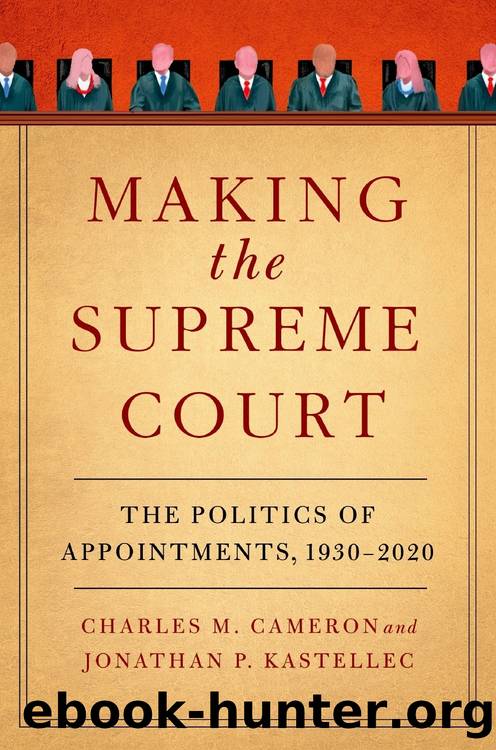Making the Supreme Court by Charles M. Cameron & Jonathan P. Kastellec

Author:Charles M. Cameron & Jonathan P. Kastellec [Cameron, Charles M. & Kastellec, Jonathan P.]
Language: eng
Format: epub
ISBN: 9780197680551
Publisher: Oxford University Press
Published: 2023-06-02T00:00:00+00:00
10.6 Conclusion: What They Wanted and What They Got
Citizens do not select Supreme Court justices; elites do. But public opinion nonetheless matters, in two distinct ways. First, senators respond to state-level public opinion (as we will show in the next chapter). So even though citizens do not vote in a national referendum on a nominee, their perceptions and evaluations remain politically consequential. Second, if we believe that public policyâeven in the form of Supreme Court appointmentsâshould reflect the will of the people, then the publicâs evaluation of a nominee carries a normative punch.
From either perspectiveâpositive or normativeâthe quality and thoughtfulness of public opinion matters. On the positive side, if opinion is capricious, uninformed, misinformed, or utterly dogmatic, how can citizens hope to control their representativesâ behavior in a beneficial way? What can such citizens expect from their government? On the normative side, if opinion is random, ignorant, or worse, why should we accord it normative value? Why should we care if such citizens do or donât get what they say they want? On the other hand, suppose citizen opinion on Supreme Court nominees resembles Andrew Gelmanâs and Gary Kingâs (1993) portrayal of opinion in presidential elections. These two scholars famously argued that public opinion in presidential elections, while volatile, ultimately becomes rather âenlightenedâ in the sense that it accurately reflects what citizens learned about the candidates during the campaign as well as citizensâ bedrock interests based on ideology and party identification. If opinion on Supreme Court nominees is similarly âenlightenedâ then responsiveness to it by senators might be beneficent, and we should afford the publicâs expressed desires considerable normative weight.
So, what does the dense empirical work in this chapter suggest about the quality and thoughtfulness of public opinion about Supreme Court nominees? Is it enlightened or benighted, somewhat Rationalist or solidly Realist?
First, citizens perceive nominees as both partisan and ideological, two attributes that are distinguishable and separable. Strikingly, on average citizen perceptions of nominee ideology are rather accurate.
Second, on average, citizens appear to evaluate nominees using both partisan and ideological criteria. On a nomination-by-nomination basis, our estimate of the relative impacts of the two are on the order of two parts party to one part ideology, though in some recent nominations, the ratio is closer to 3:1. So, both partisanship and policy orientation have mattered for citizen evaluation of nominees, and continue to do so.
Third, the partisan and ideological evaluation of nominees results in a profound gap in evaluations between Democrats and Republicans. This partisan gap grew dramatically over time, due to a bigger partisan effect and to vastly increased ideological distances between out-party members and the nominees. A contributing factor to growing distances was the partisan sort, which resulted in liberals reliably becoming Democrats and conservatives reliably becoming Republicans.
Both Realists and Rationalists may find some satisfactionâand some dissatisfactionâin these findings. For the Rationalists, citizen response to nominees is not a pure partisan knee-jerk. Citizens rather accurately perceive nomineesâ ideologies, the majority of respondents are willing to place themselves on
Download
This site does not store any files on its server. We only index and link to content provided by other sites. Please contact the content providers to delete copyright contents if any and email us, we'll remove relevant links or contents immediately.
The Secret History by Donna Tartt(16690)
The Social Justice Warrior Handbook by Lisa De Pasquale(11501)
Thirteen Reasons Why by Jay Asher(7815)
This Is How You Lose Her by Junot Diaz(5810)
Weapons of Math Destruction by Cathy O'Neil(5063)
Zero to One by Peter Thiel(4845)
The Myth of the Strong Leader by Archie Brown(4800)
Promise Me, Dad by Joe Biden(4463)
Beartown by Fredrik Backman(4452)
How Democracies Die by Steven Levitsky & Daniel Ziblatt(4435)
Stone's Rules by Roger Stone(4429)
The Fire Next Time by James Baldwin(4358)
100 Deadly Skills by Clint Emerson(4097)
A Higher Loyalty: Truth, Lies, and Leadership by James Comey(4047)
Rise and Kill First by Ronen Bergman(4029)
The David Icke Guide to the Global Conspiracy (and how to end it) by David Icke(3901)
The Farm by Tom Rob Smith(3886)
Secrecy World by Jake Bernstein(3795)
The Doomsday Machine by Daniel Ellsberg(3744)
